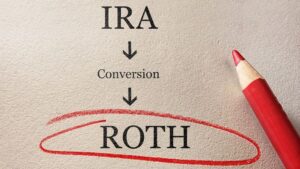Navigating Roth Conversions at 65: What You Need to Know
For many individuals nearing or in retirement, managing tax liabilities is a high priority. One strategic option that often comes up is converting a traditional IRA to a Roth IRA. But if you’re 65 years old, collecting Social Security, and sitting on a $750,000 traditional IRA, you might wonder if it’s too late to make this move. Let’s break it down.
Is It Too Late to Convert?
The Short Answer: No. There are no age or income restrictions for Roth IRA conversions in the U.S. However, the decision isn’t straightforward and involves weighing a variety of factors such as tax implications, healthcare costs, and estate planning.
In fact, spreading out conversions over multiple years can often yield better financial outcomes, especially for larger IRAs. Seeking guidance from a financial advisor can provide clarity on navigating this potential tax-saving strategy.
Understanding Roth IRA Conversions
When you convert funds from a traditional, pre-tax IRA into a Roth IRA, you’re essentially opting to pay taxes on that money now rather than later. Future withdrawals from the Roth IRA are tax-free, provided you meet specific conditions.
Here are a few key benefits of a Roth conversion:
-
No Required Minimum Distributions (RMDs): Unlike traditional IRAs, Roth IRAs are not subject to RMDs at age 73. This means you can leave your money invested without being forced to withdraw it, potentially allowing for more tax-free growth over time.
- Tax-free Withdrawals: Once the money is in your Roth IRA, it can grow tax-free, and you can withdraw contributions without penalties or taxes. However, be cautious! Any investment earnings withdrawn within five years of conversion may incur taxes.
Crafting a Tax-Savvy Conversion Strategy
Timing is crucial when it comes to conversions, especially for larger amounts. If you convert your $750,000 traditional IRA all at once, you could find yourself facing the highest tax bracket of 37%, leading to a staggering tax bill.
For instance, if you are a single filer with low taxable income, converting this entire amount could raise your tax bill by nearly $238,000—an eye-watering sum that could easily outweigh the benefits of tax-free growth later on.
To mitigate this, consider gradual conversions. Spreading the conversion of your IRA into manageable chunks—like $75,000 annually over a decade—can keep you within lower tax brackets and reduce your overall tax liability back to the 22% range.
Scenario Overview:
-
Single Conversion of $750,000:
- Tax Bracket: 37%
- Total Federal Income Tax Owed: Approximately $238,000.
- Gradual Conversions of $75,000 Annually (over 10 years):
- Tax Bracket: 22%
- Total Federal Income Tax Owed over 10 years: Approximately $88,000.
This gradual approach keeps your taxable income at feasible levels, ultimately preserving your financial health while still allowing for significant tax-free withdrawals in retirement.
Key Considerations Moving Forward
As you ponder the pros and cons of a Roth conversion, consider factors that could impact your decision:
-
Current vs. Future Tax Rates: Will your tax burden be heavier now, or do you anticipate it rising during retirement?
-
Healthcare Costs: Understanding how your healthcare expenses will affect your finances in retirement could alter your approach.
-
Estate Planning: How do your choices today affect your heirs down the line?
- Withdrawal Needs: Make sure to assess your cash flow needs and understand the five-year rule on withdrawals after conversion.
Working with a Financial Advisor
Ready to make the move? Consulting with an experienced financial advisor can help you model different scenarios to identify the optimal strategy for your specific circumstances.
And remember, when navigating Roth conversions or any retirement finance strategy, focus on building a comprehensive, long-term plan rather than getting tangled in immediate tax considerations.
Conclusion: Optimize Your Path to a Secure Retirement
Converting a traditional IRA to a Roth IRA can seem daunting, especially when you’re already in retirement. However, with careful planning and consideration, it can be a strategic move that pays off. Whether you go full throttle or gradually convert over the years, take solace in the fact that you have options that can help secure both your future and that of your heirs.
To discover more personalized financial strategies, don’t hesitate to reach out through our resources. Let us help you pave your path to an equitable retirement!

